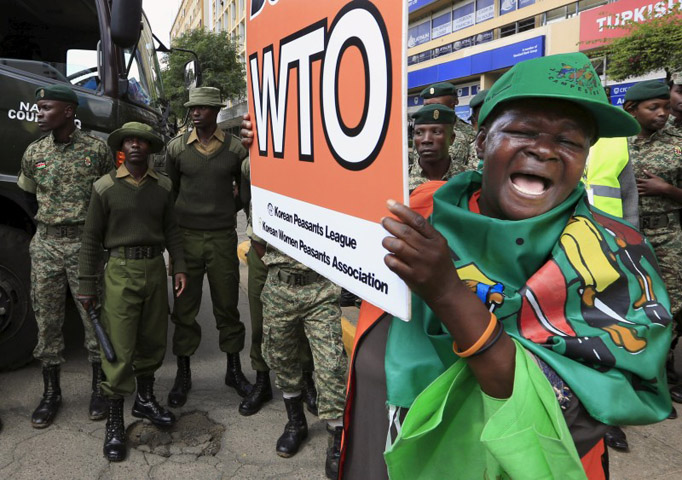
A women protests against the World Trade Organization in Nairobi, Kenya’s capital, on Dec. 17, 2015. (Noor Khamis/Reuters)
A Vatican envoy urged the World Trade Organization to keep promises made to the poor, amid concerns that its tariff-cutting efforts are disproportionately benefiting rich countries.
The appeal came as the WTO, a Geneva-based organization that regulates international trade, was holding a four-day meeting ending Friday (Dec. 18) in the Kenyan capital.
On Wednesday, more than 50 nations signed the first major global tariff-cutting deal in nearly two decades. The agreement covers hundreds of products such as computers and GPS devices, and is expected to give a $190 billion boost to the world economy.
"There is the risk that the WTO, focusing its efforts on negotiating details of complex trade agreements, could miss the point of the most relevant issues," Archbishop Silvano Tomasi, the Holy See's envoy in Geneva, said in a statement.
He noted that the organization was celebrating its 20th anniversary, and said that while globalization has lifted millions of people out of poverty, the WTO's rules often prevent the least developed nations from benefiting from trade deals.
"The Holy See hopes for a change in this approach, that it would be more aimed at fostering inclusion and development of the people, in an increasingly interdependent world," he said.
Earlier, the provincial secretary of the Anglican Church of Kenya, the Rev. Rosemary Mbogo, highlighted how WTO decisions can help the poor. Mbogo, who heads Kenya's National AIDS Control Council, said a 2001 agreement on intellectual property rights cut cost of HIV/AIDS treatment from $15,000 per person per year in Kenya to approximately $200 person.
Meanwhile, the anti-globalization group Our World is Not for Sale called for the replacement of WTO with an organization that regulates trade for the benefit of farmers, workers, communities and the environment.
"We have witnessed first-hand the negative impacts of 20 years of some existing WTO policies, which have favored the interests of the developed world over the development interests of the developing world," the group said in a statement.

